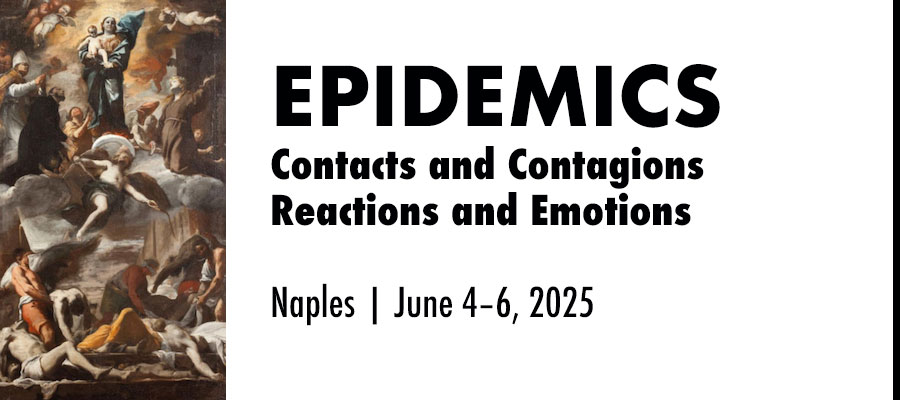Epidemics: Contacts and Contagions, Reactions and Emotions, Naples, June 4–6, 2025
The Institute of History of Mediterranean Europe of the CNR, in collaboration with the IN-HOPPE network (International Network–Historical and osteoarchaeological Past Populations Exploration), is organising a second congress on reactions and emotions in the face of epidemics in the pre-industrial age. The first congress (Majorca 2022) focused on research related to epidemics, with an emphasis on predominantly quantitative papers. In this new international, transdisciplinary, and diachronic meeting, we aim to focus on qualitatve aspects. To this end, we will discuss research in the fields of social history, medicine, mentality and emotions, as well as archaeology, psychology, epidemiology, and molecular biology. These studies will be analysed through the concepts of contact and contagion.
Epidemics have always characterised human history. Plague, typhus, smallpox, cholera and other epidemic diseases, which were highly lethal and killed quickly, have always occurred throughout history. The aetiology of these diseases was unknown and the people experiencing them wondered about their causes and their spread. In addition to miasmic ideas, which attributed the disease to the corruption of the air, contact between humans (healthy and sick), and between humans and animals, was considered one of the main causes of the disease, through the idea of contagion. It is no coincidence, in fact, that, for example, early modern plague was oſten defined as a ‘contagion’.
But contagion is something even more complex than simple contact between the healthy and the sick. Contagion is also understood as contagion of ideas, contamination of scientific knowledge, practices and experiences (F. Arena-G. Calvi, ‘Contagi: saperi, pratiche, esperienze (XVIII-XX secolo). Saggio introduvo’, in Genesis, 2022).
How do the concepts of contact and contagion influence reactions in the political, administrative, medical and scientific spheres? What emotions does the perception of possible contagion arouse among the population, various social actors, doctors and rulers?
This call attempts to understand the relationships between the four concepts of contact, contagion, reactions and emotions from a multidisciplinary perspective.
Scholars from different disciplines are invited to participate in the meeting, to present the results of their own research, and to dialogue on the basis of some common questions.
- The questions to be addressed concern - but are not limited to -:
- how do ideas of contact and contagion influence the discovery of the aetiology of certain diseases in the past?
- how do such ideas influence the choices of rulers and doctors in the management of epidemics and the reactions of individuals?
- do such ideas arouse emotions, and what kind of emotions?
- is it possible to identify different types of reactions (including emotional ones) depending on gender, age or group membership?
- do emotions shape ideas of contact and contagion throughout history and how?
In this call we intend to analyse some case studies relating to the pre-industrial period up to the middle of the 19th century (before Louis Pasteur's discoveries), in a global geographical context, promoting a comparison between different historical periods, in order to study their evolution and possible changes with a view to continuity or discontinuity.
The colloquium will be held in Naples (Italy), from 4 to 6 June 2025, at the Polo Umanistico of the National Research Council (CNR) and the Fondazione Banco di Napoli.
Presentations (max. 20 minutes) may be given in English, Italian, Spanish or French. Power Points, posters and abstracts must be submitted in English.
